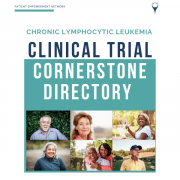How Do You Know If Your CLL Treatment Is Working?
How Do You Know If Your CLL Treatment is Working? from Patient Empowerment Network on Vimeo.
How do you know if a chronic lymphocytic leukemia (CLL) treatment approach is effective? Dr. Susan O’Brien, a Hematology-Oncology specialist, explains how CLL treatment response is monitored.
Dr. Susan O’Brien is the Associate Director for Clinical Science, Chao Family Comprehensive Cancer Center.
See More From The Pro-Active CLL Patient Toolkit
Related Resources

|
 What Are Common CLL Treatment Side Effects? What Are Common CLL Treatment Side Effects? |
 How to Be A Partner in Your CLL Care How to Be A Partner in Your CLL Care |
Transcript:
Katherine:
But how is that treatment monitored to evaluate its effectiveness?
Dr. Susan O’Brien:
Well, generally the things we’re – the same things we’re look – the same things we’re looking at when we treat. Right? So, we’re looking at abnormal blood counts. We’re looking at enlarged lymph nodes or spleen. We have symptoms. So, those three things are looked at when the patient is on the therapy. Are the lymph nodes shrinking? Are the blood counts improving? Are their symptoms getting better?
So, the same way pretty much that we would follow a patient who’s not on a clinical trial is the way we follow them on a clinical trial. Now, if it’s a very new drug which has never been given to humans before, let’s say, those trials probably have more frequent surveillance than we might do with a drug that we are familiar with and know what to expect with it. So, sometimes the trials might have more surveillance, more visits, more tests.
But generally, if those tests or visits are required – are not considered standard of care, the companies pay for them. So, usually what’s billed to the insurance is only what we would do treating any CLL patient with an already available drug.
So, it doesn’t wind up costing the insurance or the patient any more to be on a clinical trial. And they might get actually – there is some data the patients on clinical trials get better care because they’re being monitored very carefully as part of the trial.









